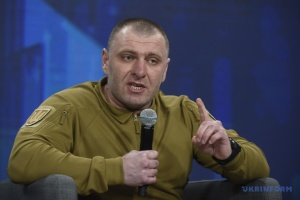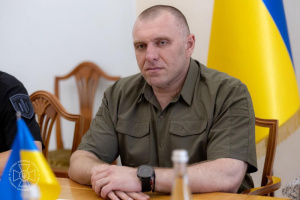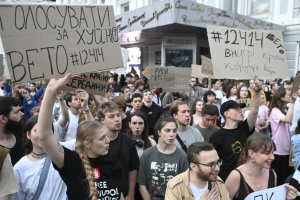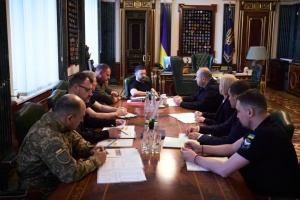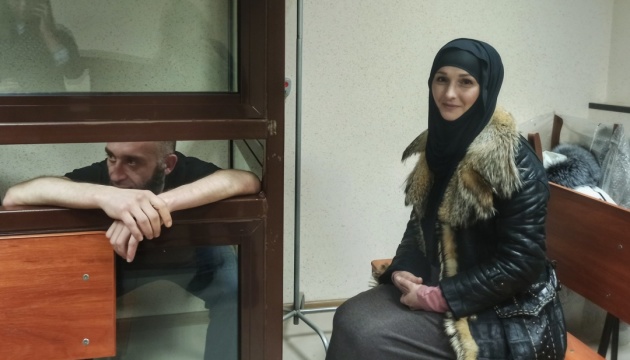
Crimean trial on several examples
She hit the nail on the head and, with her own words, she pressed on what had long been inside, but had not turned into a constructive monologue in any way.
Now I will try to explain to people far from this process what Crimean trial means on a few examples.
When I started working in Crimea, I bought myself 50 A4 leaflets for applying for petitions to take photos and film in court. I ran out of them two weeks ago. So I wrote 50 petitions to different judges in different Crimean courts with the request to carry out my professional journalistic activities. In reality, during my work here, I filmed at most 15 court sessions. A good half of them concerned the trial of Ukrainian farmer Volodymyr Balukh. He is finally free and recalls that time, probably like a nightmare. To make it clear, the trial of him took place in Rozdolne District Court. This is a dilapidated building, its facade featuring a bas-relief in the form of the hammer and sickle. And it looks so unreliable that every time I tried to quickly slip under it so that all the splendor would not collapse on my head. In front of the building, there is a huge statue of Lenin, painted in gold, and inside there are creaking parquet floorboards and a bailiff at the entrance with a "sleeve" clogged with tattoos, who at the end of the case no longer asked us who we were, but said: "Hello, are you heading to political prisoner Balukh? Come on in." There I felt more or less free: I was always allowed to film, sometimes I could move around the hall.
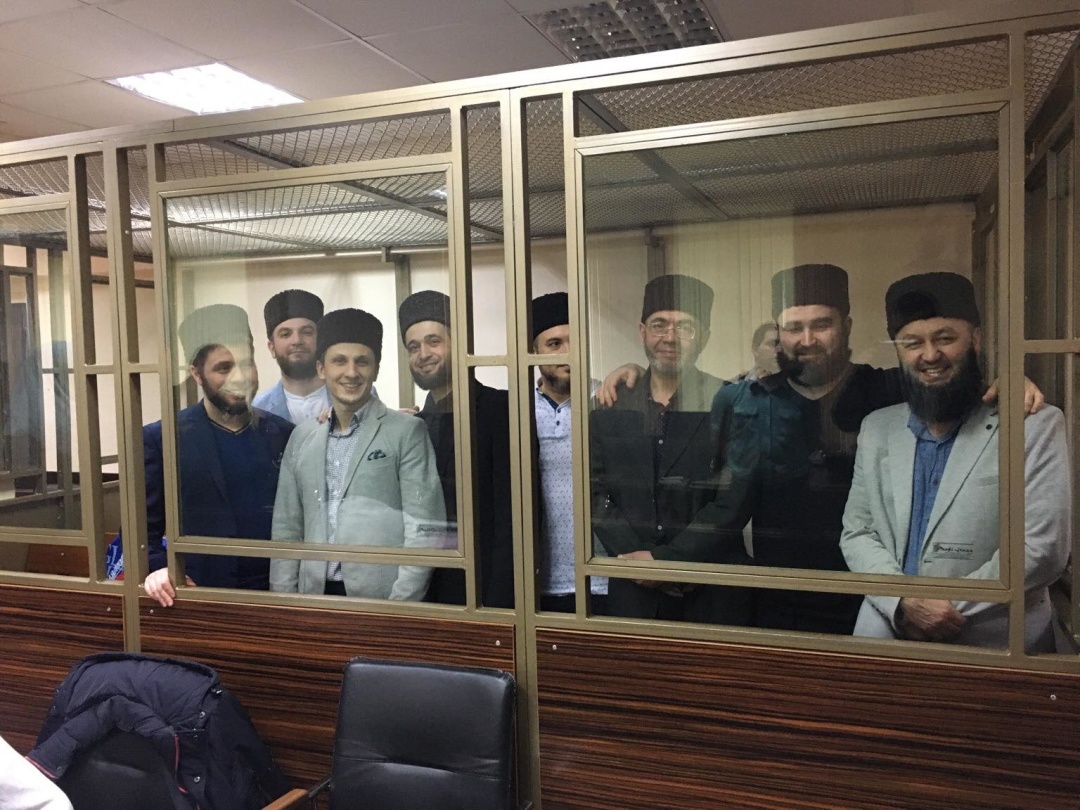
Today, during meetings to extend the measure of restraint for defendants in the so-called second Simferopol "Hizb ut-Tahrir case." I was allowed to film twice. During two different trials. This is nonsense. But again, in written permission, I wrote with my own hand: "I undertake not to photograph or film the prosecutor, judge, and investigator," because otherwise, they will forbid that even without talking, referring to the "safety of the participants in the trial." That was the case ten times. In a short break, after the meeting, two police officers and a bailiff approached me and warned or threatened, but did not ask me for their faces not to appear in the video. During the meeting, the bailiff was standing behind me and a citizen journalist, human rights activist Lutfie Zudieva, looking at our phones for two hours in a row.
After the first court session, I went outside, and when I came in, the bailiffs at the entrance told me that the judge had forbidden the filming of the second trial:
"The trial has not yet begun. How do you know that?"
"The court clerk told us."
"The court clerk can only transfer my petition. The decision on filming is made at the beginning of the session."
"Lady, can you hear us, can't you?"
What could I say? I answered that I heard well and preferred to hear that personally from the judge, who, by the way, allowed the filming.
As it turned out later, in the neighboring room, where the measure of restraint was extended for Medzhit Abdurakhmanov and Vladlen Abdulkadyrov, there was an even more interesting situation. During the break, investigator Sergei Makhnev said: "Shut your mouth, I'm not talking to you! [...] I'm not your son, mother, or daughter here. I'm an investigator. Do you understand me? Sit and listen while you have been given such an opportunity." This was addressed to a listener who came to the session.
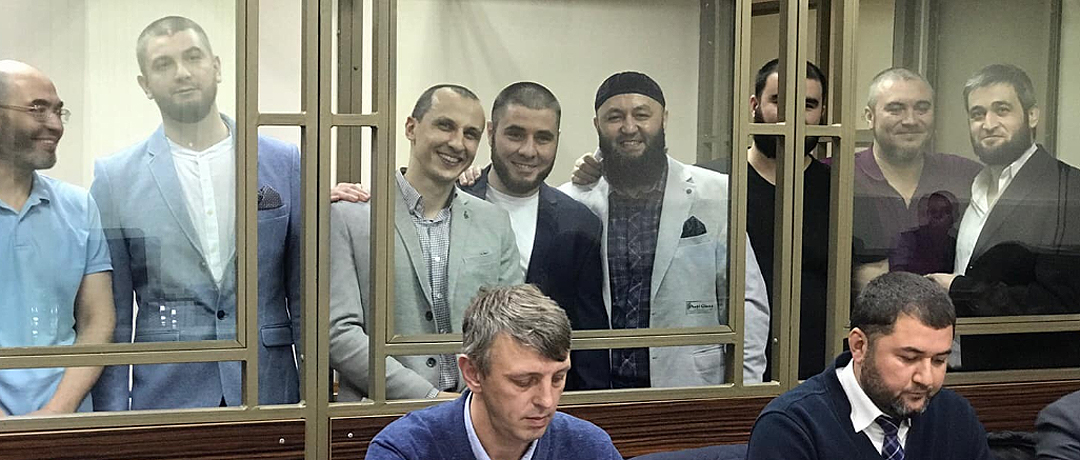
Each time the trial takes place behind open doors, the bailiffs announce at the entrance how many people can enter the courtroom: nine, six, and so on. There were three defendants at each trial that I attended today. Naturally, as it usually happens, a great number of relatives and friends arrived and wanted to attend the court session. And here I want to thank my colleagues who let me go. I apologize to relatives who could not attend the trial because of me. The question in this situation is either publicity or to see your son/husband/brother/nephew, whom you have not seen for months because conditions are dictated, and you have to adjust. But you have to work despite everything, so that people in prison do not turn into a list of some obscure names and surnames, but remain people, alive, talking, transmitting their thoughts even through the glass of the "aquarium." Well, so that you open the photo and can say: "Look, this is Yashar Muedinov, before the meeting he was quietly telling a joke about the colonel to his lawyer. I don't remember the joke, but it was fun. And then he asked me for an hour to give him a handkerchief because he felt bad."
When small courtrooms are allocated, and there are many people who want to attend court sessions, there is such a technique as swapping places during a break - people who attended the main part of the trial go out and other people come in for an announcement and somehow try to see their loved ones for a couple of minutes. Today I remember the eldest daughter of the seriously ill Jemil Gafarov who did not want to leave the courtroom in any way. "Well this is my dad, please, can I stay here?"
Some kind of system of constant cruelty and humiliation in the details. There are not enough words to describe it as a whole - only in fragments. I'm already used to it, but I never cease to be surprised.
In the photo: a portrait of an average Crimean Tatar family on the peninsula today. In the "aquarium": a defendant in the second Simferopol group "Hizb ut-Tahrir," Riza Izetov, and his wife, Zeineb. By the way, in 2017, when I didn't even figure out how the system of modern Crimean justice works, I started taking pictures of listeners in the corridors of the court. Here you need to understand that at that time, I was pampered by the Ukrainian courts, when I opened the door with a tripod, said hi and just worked. While taking pictures, the court clerk ran out of the office and shouted that I was taking pictures without permission and that a protocol should be drawn up against me. I didn't even understand at what moment Riza appeared and said in a soothing tone, with a smile, that I would delete all the photos, that no protocols were needed, that everything would be fine. In general, while he was talking to the clerk, I had time to clean the phone. And can you guess what struck me the most? That day, he saw me for the first time in his life, and he did not even know my name. Then we met. I think that it is about people like him who break this system of total cruelty, about which I wrote above. It seems that this system is breaking Riza, Remzi, Osman, Ruslan, Nariman, and many others, holding them in jail, serving inhuman prison terms, trying to intimidate them. But in fact, this system has been coming apart at the seams for a long time.
P. S. Riza, thank you very much, you see, after three years I'm filming in court again, but now with the permission, and today nobody even threatened me with an administrative penalty.
Oleksandra Yefymenko

